Democracy on Mute: The Erosion of Media Freedom in Georgia
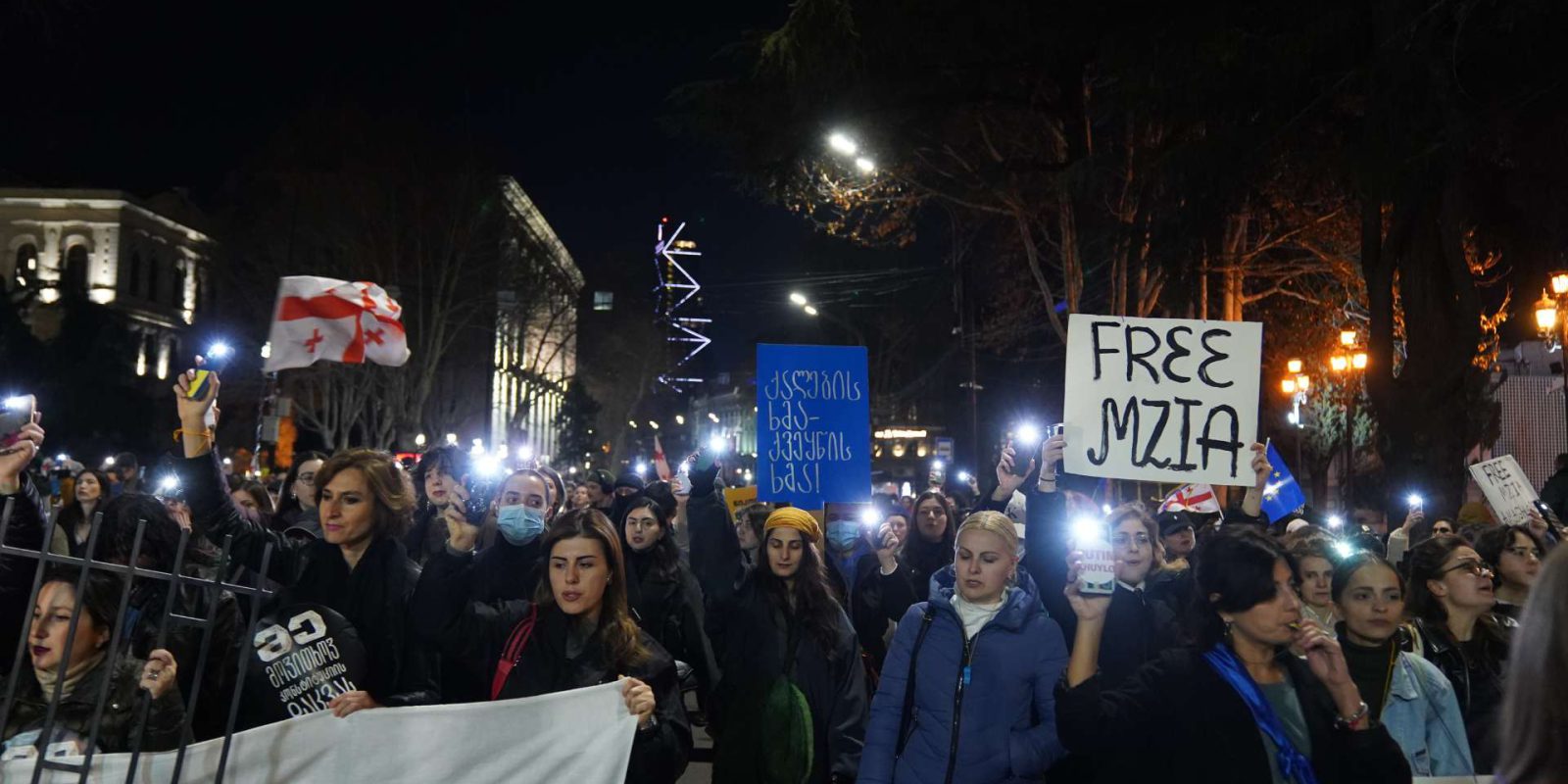
Um den Artikel auf Deutsch zu lesen, hier klicken.
Once a beacon of media freedom in the post-Soviet space, Georgia is now witnessing a sharp and alarming decline in journalistic independence under the ruling illegitimate Georgian Dream (GD) party’s new political era, as detentions, attacks, and legal pressures target the country’s once-thriving independent media.
By writing this article, I want to express my gratitude, admiration, and solidarity with every single person standing on the protest lines, those who are unjustly detained, and my journalist colleagues and friends for their dedication and tireless work.
As I write this article, one of the bravest and boldest Georgian women, a co-founder of regional media Batumelebi and Netgazeti, Mzia Amaghlobeli, was detained on January 11, 2025. Authorities claimed she disobeyed police orders, although multiple eyewitnesses and video evidence contradicted this claim. Despite several court hearings, none ruled in her favour, raising serious concerns about judicial independence and selective justice. The current illegitimate ruling party in Georgia is targeting anything that remains independent and free – especially fighters for truth.
An Attack on Independent Media
Before I write about the occasions of attacks on media representatives, I will briefly explain what the media landscape in Georgia looks like. Noteworthy is the fact that independent media in Georgia became the main source of information only in the past few years, mainly in the bigger cities. Independent media in Georgia are mostly online media, which requires an internet connection. According to Media Landscapes data, the internet penetration (global internet usage) level by 2025 is 52.9 %. Therefore, low internet penetration means that half of the population still does not have regular access to the internet. It limits their ability to follow online independent media, especially in rural areas, where the main source of information are different TV channels.
November 28th, when illegitimate prime minister Irakli Kobakhidze announced that Georgia’s EU accession negotiations would be suspended until 2028, became a turning point in Georgian politics. Halting EU ambitions and triggering a new wave of civil unrest, raising alarm among Western allies over the country’s democratic trajectory, deriving non-stop protests since.
Public Broadcaster
For over 6 months, protesters gather outside the Georgian Public Broadcaster (GPB) building, accusing it of acting as a mouthpiece for the ruling party. Once trusted as a balanced public institution, GPB now faces backlash from citizens who feel their voices and realities are not reflected in the broadcaster’s coverage. “The protests outside its building represent not just dissatisfaction with one institution, but a broader rejection of media co-opted by the state”, said Keti Kapanadze, a former main producer of „Realuri Sivrtse“ (Real Space), a platform on TV1, the main TV channel of the Georgian Public Broadcaster. „Realuri Sivrtse“ connected people facing societal issues with experts, agencies, or the public to seek solutions through open dialogue.
Keti entered the journalism field 40 years ago and has witnessed how the „journalism weather“ has changed during the last years of the Soviet Union and under five different presidents of independent Georgia. She recalls that during every different ruling party, there were particular demands from different media outlets, but she always remained loyal to her faith in truth and independence in telling stories. “What is happening now in Public Broadcaster is heartbreaking. For ten years, the goal of the program has always been to ensure constructive discussion and search for a solution together”.
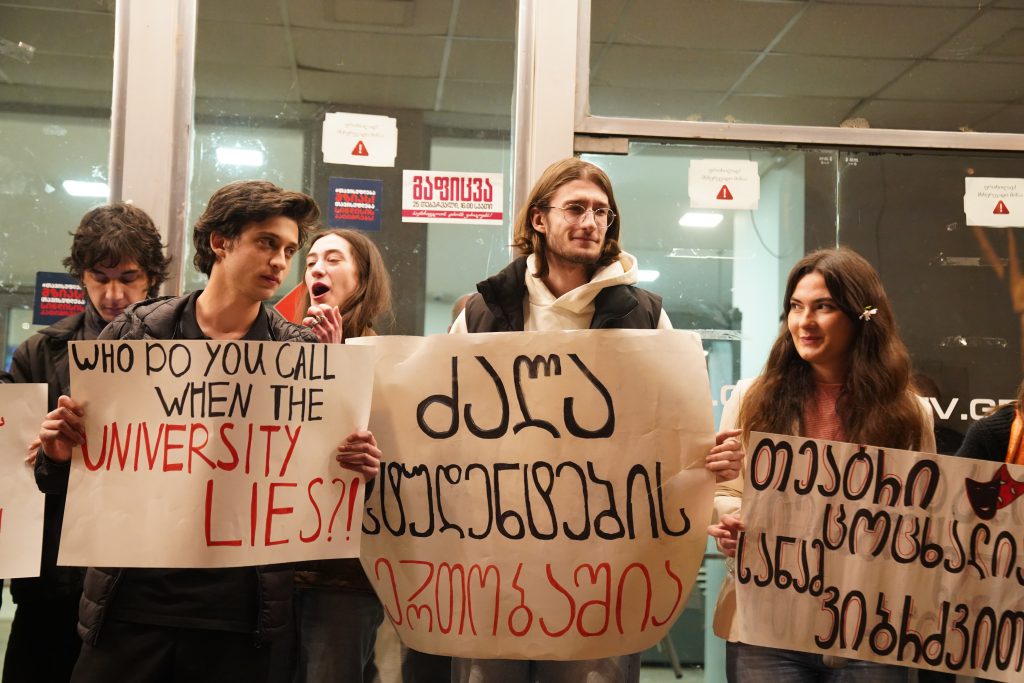
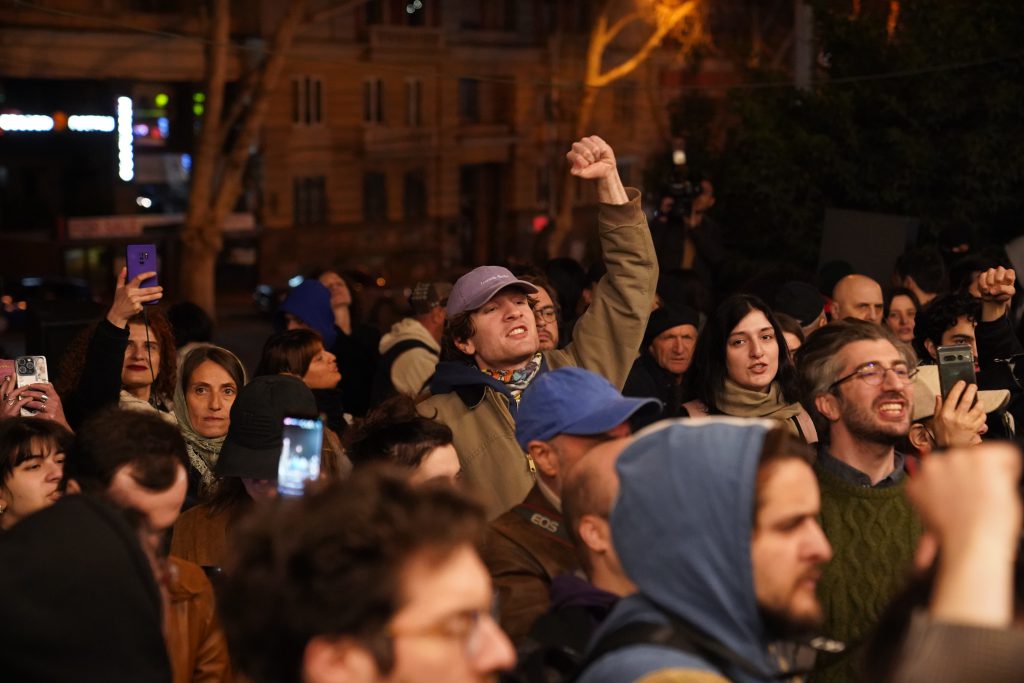
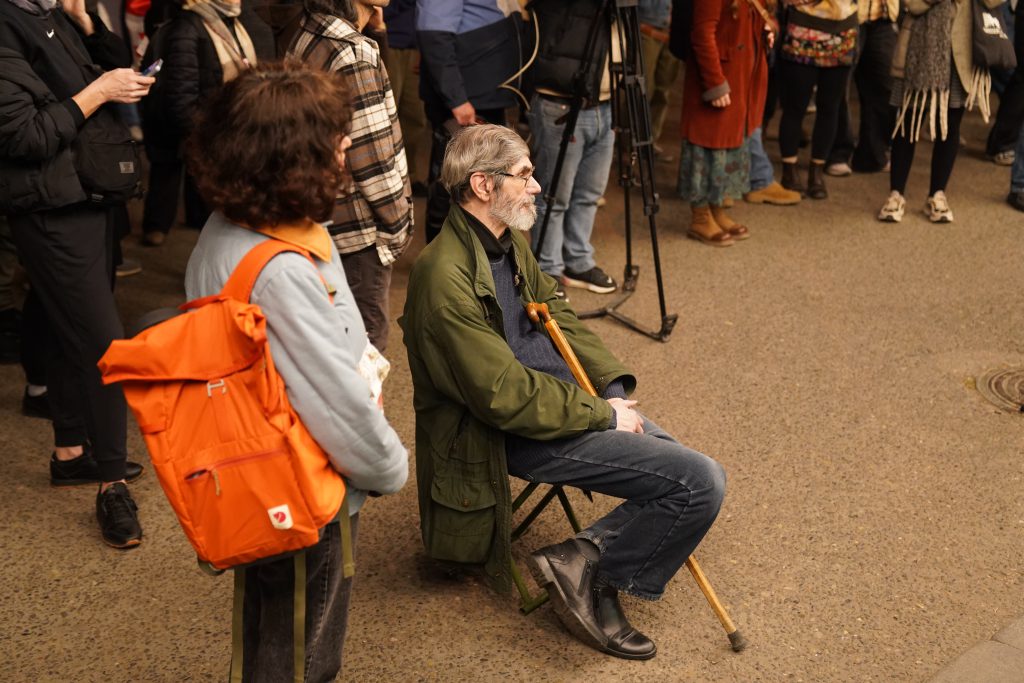
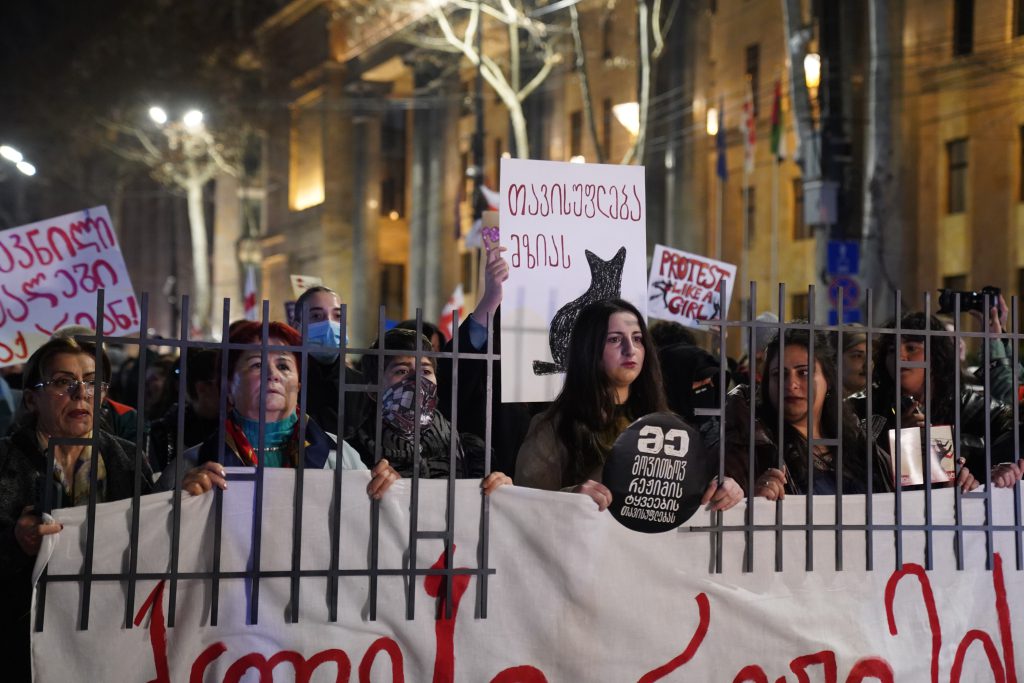
Keti noted that they reported on issues affecting rural areas of Georgia, such as lack of access to public transportation and water supply, and difficulties in communicating with relevant authorities. They also covered stories about children with Down syndrome, helping to promote positive changes, along with many other important environmental, social, and political topics. The TV1 show „Realuri Sivrtse“ officially ended after its project term expired on May 1, 2025. The Georgian Public Broadcaster informed the team on April 30, 2025, that the program would not be renewed following the dismissal of its host, Nino Zautashvili and the whole staff including Keti Kapanadze.
“The adoption of laws on „foreign influence“ and „family values“ marginalizes journalists, exposes them to censorship and reduces space for free speech”, reported Reporters Without Borders.
Attacks on Journalists
The Detention of Mzia Amaghlobeli
In the early 2000s, courageous journalism played a pivotal role in exposing corruption, mobilizing society, and shaping the country’s democratic trajectory. In 2001, Mzia Amaghlobeli and Eter Turadze founded the regional media platform Batumelebi. Since 2001, Batumelebi has uncovered a significant number of essential regional topics, starting from human rights, socio-politics, and environmental issues, connecting respective sources and exposing personal stories, that further caused positive changes.
One of the most alarming incidents illustrating the media crackdown is the arrest of Mzia Amaghlobeli. Irma Dimitradze, a journalist and communications manager of Batumelebi/Netgazeti said, that the health condition of Mzia is alarming day by day. Mzia was on a hunger strike for 38 days, and later sent a letter, saying “I do not want my hunger to weaken you – you must fight in my place”.
Dimitradze mentioned, that for an increasingly autocratic regime, controlling the media is essential to maintaining power. Independent journalists disrupt narratives, expose corruption, and amplify dissent – all threats to a government intent on silencing opposition and shifting closer to authoritarian governance.
“Each time there’s Mzia’s or anyone else’s court, we witness how tumorous this regime is, and it has its metastasis in every socio-political or cultural realm. Hence, nowadays it is almost impossible to find any independent area in this country.” Dimitradze mentioned that GD’s action plan against independent media or organisations is quite chaotic and fast, yet still slow. “Yes, they attacked and detained journalists, but yet, some of the main independent media entities still operate. Nothing is stopping Georgian Dream from shutting down all independent media — but doing so would be an extremely drastic step. It will make people madder and the number of protesters will increase. Doing evil things slowly is a signature of the Georgian Dream party.”
Violence Against Journalists
According to the Mapping Media Freedom platform, at least 50 journalists faced physical attacks and threats or were blocked from doing their work while police forcefully broke up the pro-EU protests.
One of these journalists was from the online media Publika, Aleksandre Keshelashvili. He was covering a protest rally when he was arrested and severely beaten by riot police. After being taken to the police station, he was told he was being detained for a misdemeanour. The journalist ended up in the hospital that day – with a broken nose, which required surgery. The Special Investigation Service launched an investigation into the violence against the journalist. The perpetrator has not been found.
On the court day, the Tbilisi City Court Judge found him guilty of disobeying the police and issued him a verbal reprimand. She discontinued the case on the petty hooliganism charge. Keshelashvili said, that he didn’t expect such a little „penalty“. “In a given situation, I was ready for the worst-case scenario, but not verbal reprimand. But their arguments against me, saying that I was cursing and verbally insulting police while wearing a face mask were absurd. Moreover, two different police witnesses said two different things. By doing so, they diminished their own arguments against me.” Keshelashvili mentioned, that his case is quite unique: “None of the other journalists or protesters were released so easily, even without a fine.” Keshelashvili faithfully continues his work in Publika.
Some journalists were even fined 5,000 Georgian lari (approx. 1,570 euros) for “blocking the road” – a charge imposed while they were actively reporting on public demonstrations. Mariam Nikuradze, a founder of OC Media, is one of the other journalists who has been fined multiple times while covering the protests, a total of 20,000 Georgian lari (€ 6,300). Nikuradze appealed this fine to the Ministry of Internal Affairs, but this appeal was rejected. She mentioned that the decline in media freedom in Georgia is not coincidental but deeply tied to the political trajectory of Georgian Dream.
Over the past few years, the ruling party has intensified its efforts to silence dissent and control narratives, culminating in the passage of the controversial „foreign agents“ law in 2024. This law, which mimics Russia’s draconian legislation, forces media outlets receiving more than 20 % of foreign funding to register as „agents of foreign influence“, thereby stigmatizing and isolating them from the public. Nikuradze mentioned that due to the drastic changes in the media landscape, citizens feel cautious while renting out a space for the office of independent media outlets. “Now we reap what GD sow for years against the independent media. Blackmailing media is a common strategy for authoritarian regimes, but in Georgia, it started in 2021 and accelerated after the full-scale invasion of Ukraine. Some people refused to rent out their place to us, after learning that we represent OC Media. They are scared, and I understand it.”
International Response
The international community has been vocal in its criticism. Organizations such as Reporters Without Borders (RSF), the Committee to Protect Journalists (CPJ) and the European Federation of Journalists have condemned the Georgian government’s actions, warning that the country is drifting toward authoritarianism. The European Union and the U.S. State Department have also expressed concerns, linking media freedom to Georgia’s democratic and Euro-Atlantic aspirations.
The ruling party has rejected accountability, instead framing independent media as political actors or foreign agents.
As protests continue and as I am writing this article, another law has been enforced later this evening. Not all the media will be allowed to record court sessions. Court sessions can be recorded only if the judge approves a written request. The Public Broadcaster can record without limits. If it doesn’t, another broadcaster can request permission in writing before the session begins.
Maria Ressa, the CEO of Rappler, a Philippine digital outlet, once said in an interview: “This is the time to fight. This is the time to tell people that here’s the line, and you have to make sure that our government doesn’t cross it because when it does, we are no longer a democracy.”
LELA JOBAVA graduated from Caucasus University with a degree in European Studies. She is a conflict researcher and a journalist from Gali, Abkhazia. Driven by her passion for conflict-driven reporting, storytelling, and filmmaking, Lela is committed to covering diverse ethnic, religious, linguistic, and gender-related topics, and crafting distinctive stories that highlight unique perspectives. Lela is particularly invested in providing coverage of current affairs and uncovering the untold stories of the unhurried pace of life in Abkhazia, which has remained concealed under the veil of globalization. The themes of memory and identity are integral elements in her work.









